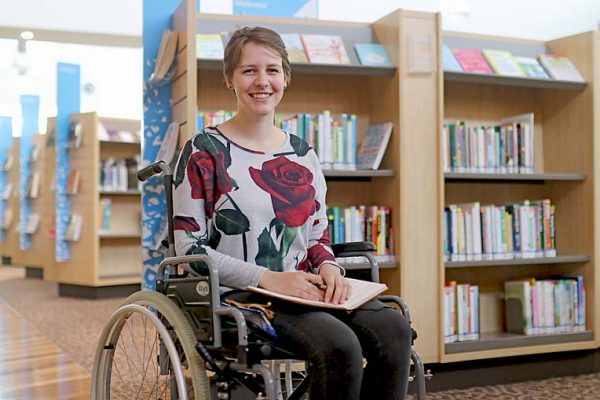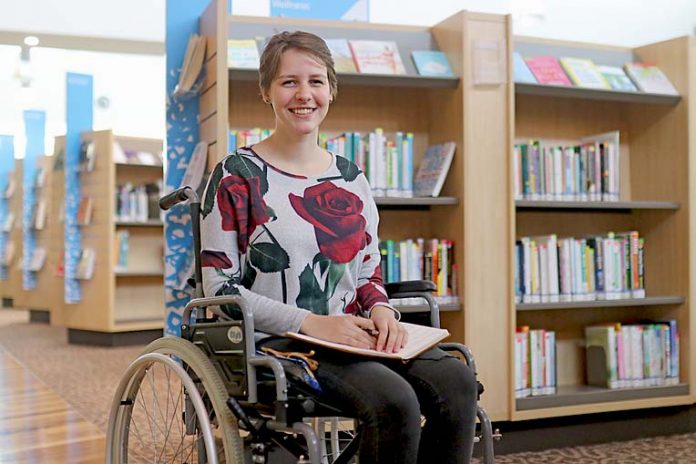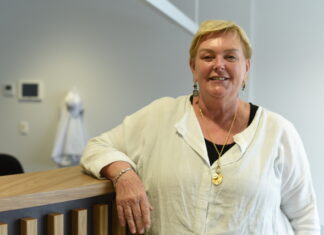
Picture: MOLLY TAYLOR
MOUNT Gambier resident Tessa Deak has been recognised for her dedication to raising awareness about an uncommon disability with a nomination for the International Day of People with Disability award.
The young Limestone Coast woman’s life suddenly changed when she was diagnosed with an uncommon disability she knew little about.
Tessa Deak was finishing Year 9 at high school when diagnosed with Myalgic Encephalomyelitis, also known as chronic fatigue syndrome, just over six years ago.
The illness is a devastating multi-system disease that causes dysfunction of the neurological, immune, endocrine and energy metabolism systems.
It results in lack of energy which does not improve with rest.
Following her diagnosis, Ms Deak said her life turned out completely different to how she had initially planned.
“I was hoping to go overseas for a working holiday and do some volunteering or I would save some money,” she said.
“It changed from, ‘if I can not go overseas than maybe I can travel in Australia’.
“Then, I could not get my driver’s licence which meant I could not really do that either.”
Ms Deak was unable to get a job and save money to do the things she wanted to do.
“I wanted to try and at least study, but then I had to leave school because I was so sick,” she said.
“There were many obstacles, but I always tried to not lose hope of what my life was going to be.
“I was always trying to come up with new things and enjoy what I can do.”
Ms Deak said she tried to be involved in the community as much as she could and started volunteering at headspace as a youth ambassador.
“I really struggled in the first two years but it got to the point where I thought it was going to get extremely dangerous and unhealthy,” she said.
“I think I was over grieving, I have always been a positive person so I think the two years where I was struggling were weird and hard.
“I was missing out on a lot of life.”
Ms Deak said she had gradually been able to take control of her illness through management and understanding.
“A lot of doctors and people in general do not actually understand much about it, but the biggest key to understanding for me was the movie Unrest,” she said.
“Sometimes when you have been sick for a while, you start feeling like maybe I am just making it all up.”
Ms Deak said the film, which focuses on a woman struck down by a fever that leaves her bedridden, prompted a social change movement within the Myalgic Encephalomyelitis community.
“We are often referred to the millions missing because we are missing from our lives and we are not heard,” she said.
“People began to create these platforms to bring people together and have a voice.
“I think that was when my journey really began and we held an Myalgic Encephalomyelitis awareness night.”
After the event, Ms Deak realised there was not many avenues of support in Mount Gambier for diseases like Myalgic Encephalomyelitis.
“I then began Chronic Illness Support Limestone Coast in April last year.
“The Wellbeing and Wellness Festival was then created which debuted earlier this year.
“It went well with over 400 people who came through the doors and we are hosting another on February 15 next year.”
Ms Deak said she was taken by surprise when she found out she was nominated for the International Day of People with Disability award, which will be presented today at the Main Complex and Cave Gardens.
“I think this event is excellent, especially for minorities like people living with a disability,” she said.
“I thank Anne Bawden for nominating me and I think it is important to celebrate people’s achievements.
“I think able-bodied people may see people living with a disability as an inspiration or they look down on them.
“Their everyday achievements are still important.”
Ms Deak said disabilities encompassed chronic illness, invisibly illness and physical injuries.
“We all have impairments of some sort, but disability is more to do with inaccessibility,” she said.
“As soon as you give them that accessibility, their life is not hindered in anyway.
“For example, if somebody has poor eye sight, they are only disabled when they are not wearing their glasses.”
Ms Deak said she would love to see more research be dedicated to Myalgic Encephalomyelitis, or a cure to be found.
“At this point in time, they say somebody who is living with Myalgic Encephalomyelitis and has for over five years, there is about a 5pc chance of full recovery,” she said.
“The chances of me being able to run a marathon in the next few years are not huge, but I have been able to manage it better I have been able to use my window well.”
The Limestone Coast International Day of People with Disability celebration will be held today from 11am to 1pm with awards being presented from noon.








